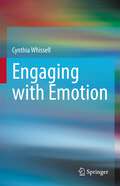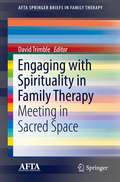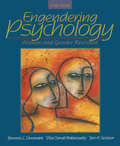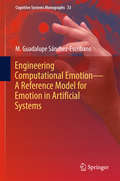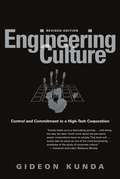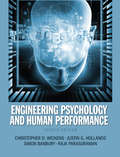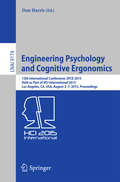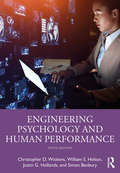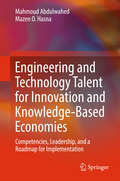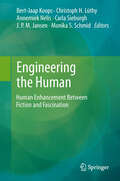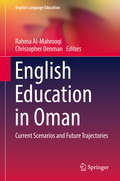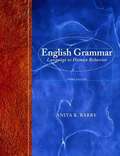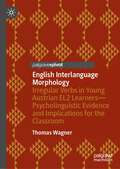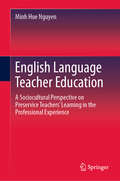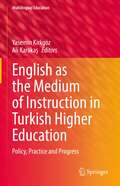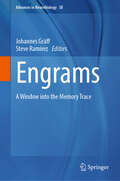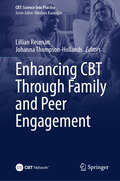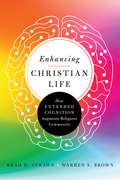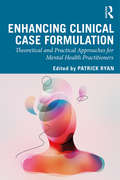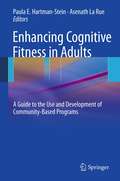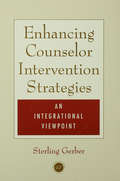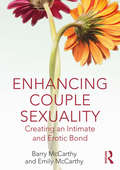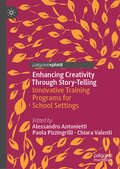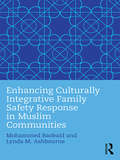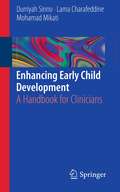- Table View
- List View
Engaging with Emotion
by Cynthia WhissellThis work informs by encouraging the reader to interact with the text itself and with the literature in the area. It is a learning tool rather than an encyclopaedic presentation of its topic. The writing style is personal, direct and accessible. Citations are employed, but always for specific purposes. Cited materials are made accessible whenever possible by the provision of URLs. Readers learn about emotion and its relationship to brain, body, cognition, memory, and appraisal. They are also introduced to the role of emotion in language and in the fine arts. Readers of Engaging with Emotion will likely be students within the first two years of university or college taking a related course, or those who are interested in learning more about emotion. This book is ideal for adaptation to an online course format as it includes exercises and learning guides. The book uses straightforward and helpful language and examples to avoid frustrating or confusing students, but instead to keep them actively involved with the material in the book, and to help motivated learners learn.
Engaging with Spirituality in Family Therapy: Meeting In Sacred Space (Afta Springerbriefs In Family Therapy Ser.)
by David TrimbleThis inspiring volume presents a unique and ethical professional framework for engaging in spiritual discussion in the context of family therapy. Addressing existential contradictions of life that can disrupt family functioning as well as religious restrictions that can create relational barriers, it models an open frame of mind for sensitive and respectful metaphysical work with diverse families. Chapter authors build on their own narratives of spiritual journey as they inform conversation with clients whose faith perspectives include Christianity, Judaism, Islam, African and Native American spiritual practice, Taoism, and Sikhism. These powerful dialogues illuminate the deeper tasks of therapy and offer significant opportunities for all family members to be involved in creating meaning and healing together.This one-of-a-kind book:Presents the narratives of a racially, culturally, and religiously diverse group of authorsExplores the challenges of metaphysical psychotherapeutic practiceFocuses on the intersection of therapeutic practice and spirituality in various cultural contextsGuides therapists in looking into their own spiritual lives and experienceModels methods for therapists using spirituality in sessions with familiesChallenging professionals to step beyond the perceived boundaries of the therapist/client relationship, Engaging with Spirituality in Family Therapy: Meeting in Sacred Space is rich and eloquent reading for practitioners and researchers in family therapy.
Engendering Psychology: Women and Gender Revisited
by Florence Denmark Vita Carulli Rabinowitz Jeri A. SechzerEngendering Psychology's treatment of issues is based solidly on scientific evidence and presented in a balanced manner. The text combines a developmental and topical approach. Denmark, Rabinowitz, and Sechzer explore the concept of gender as a social construction across the lines of race, ethnicity, class, age, and sexual orientation, pulling from the exciting new scholarship that has emerged over the last few years. Thoughtful discussion questions emphasize critical thinking skills, as well as encourage students to open a dialogue with both their professors and their peers. This text will help readers understand the concept of gender as a social construct in contrast to the concept of sex, which denotes biological differences. Upon completing this text, readers will have a deeper understanding of women and the knowledge that "woman" is a diverse and multifaceted category.
Engineering Computational Emotion - A Reference Model for Emotion in Artificial Systems
by M. Guadalupe Sánchez-EscribanoThis book provides a new perspective on emotion in artificial systems. It presents an insightful explanation of how emotion might emerge deep inside the systems, and emotional behaviour could be seen as a consequence of their internal management. The final approach attempts to account for a range of events associated with emotion, from functional and behavioural features to aspects related to the dynamics and the development of feeling. The book provides a theoretical foundation for engineering and designing computational emotion as a framework for developing future adaptive systems. It includes a painstaking analysis of the rationales for the features of the final approach, including aspects from the fields of Artificial Intelligence, Psychology, the Cognitive Sciences and Model-based Systems. Synthesizing knowledge from a variety of disciplines, it ultimately presents a model conceptualization following the perspectives of Engineering and the Cognitive Sciences.
Engineering Culture: Control and Commitment in a High-Tech Corporation
by Gideon KundaEngineering Culture is an award-winning ethnography of the engineering division of a large American high-tech corporation. Now, this influential book—which has been translated into Japanese, Italian, and Hebrew—has been revised to bring it up to date. In Engineering Culture, Gideon Kunda offers a critical analysis of an American company's well-known and widely emulated "corporate culture. " Kunda uses detailed descriptions of everyday interactions and rituals in which the culture is brought to life, excerpts from in-depth interviews and a wide variety of corporate texts to vividly portray managerial attempts to design and impose the culture and the ways in which it is experienced by members of the organization. The company's management, Kunda reveals, uses a variety of methods to promulgate what it claims is a non-authoritarian, informal, and flexible work environment that enhances and rewards individual commitment, initiative, and creativity while promoting personal growth. The author demonstrates, however, that these pervasive efforts mask an elaborate and subtle form of normative control in which the members' minds and hearts become the target of corporate influence. Kunda carefully dissects the impact this form of control has on employees' work behavior and on their sense of self. In the conclusion written especially for this edition, Kunda reviews the company's fortunes in the years that followed publication of the first edition, reevaluates the arguments in the book, and explores the relevance of corporate culture and its management today.
Engineering Psychology & Human Performance: International Edition
by Raja Parasuraman Christopher D. Wickens Simon Banbury Justin G. HollandsForming connections between human performance and design Engineering Psychology and Human Performance, 4e examines human-machine interaction. The book is organized directly from the psychological perspective of human information processing. The chapters generally correspond to the flow of information as it is processed by a human being--from the senses, through the brain, to action--rather than from the perspective of system components or engineering design concepts. This book is ideal for a psychology student, engineering student, or actual practitioner in engineering psychology, human performance, and human factors Learning Goals Upon completing this book, readers should be able to: * Identify how human ability contributes to the design of technology. * Understand the connections within human information processing and human performance. * Challenge the way they think about technology's influence on human performance. * show how theoretical advances have been, or might be, applied to improving human-machine interaction
Engineering Psychology and Cognitive Ergonomics
by Don HarrisThis is the sixth edited volume of refereed contributions, from an international group of researchers and specialists. Volumes five and six comprise the edited proceedings of the Third International Conference on Engineering Psychology and Cognitive Ergonomics, organized by Cranfield College of Aeronautics, Edinburgh, Scotland, October 2000. The applications areas include aerospace and other transportation, medicine, human-computer interaction, process control, and training technology. Topics addressed include: the design of control and display systems; human perception, error, reliability, information processing, and performance modelling; mental workload; stress; automation; situation awareness; skill acquisition and retention; techniques for evaluating human-machine systems and the physiological correlates of performance. Both volumes will be useful to applied and occupational psychologists, instructors, instructional developers, equipment and systems designers, researchers, government regulatory personnel, human resource managers and selection specialists; also to senior pilots, air traffic control and aviation and ground transportation operations management.
Engineering Psychology and Human Performance
by Christopher D. Wickens Simon Banbury Justin G. Hollands William S. HeltonForming connections between human performance and design, this new edition of Engineering Psychology and Human Performance examines human–machine interaction. The book is organized directly from a psychological perspective of human information processing, and chapters correspond to the flow of information as it is processed by a human being—from the senses, through the brain, to action—rather than from the perspective of system components or engineering design concepts. Upon completing this book, readers will be able to identify how human ability contributes to the design of technology; understand the connections within human information processing and human performance; challenge the way they think about technology’s influence on human performance; and show how theoretical advances have been, or might be, applied to improving human–machine interactions. This new edition includes the following key features: A new chapter on research methods Sections on interruption management and distracted driving as cogent examples of applications of engineering psychology theory to societal problems A greatly increased number of references to pandemics, technostress, and misinformation New applications Amplified emphasis on readability and commonsense examples Updated and new references throughout the text This book is ideal for psychology and engineering students, as well as practitioners in engineering psychology, human performance, and human factors. The text is also supplemented by online resources for students and instructors.
Engineering and Technology Talent for Innovation and Knowledge-Based Economies: Competencies, Leadership, and a Roadmap for Implementation
by Mahmoud Abdulwahed Mazen O. HasnaThis book introduces and analyzes the models for engineering leadership and competency skills, as well as frameworks for industry-academia collaboration and is appropriate for students, researchers, and professionals interested in continuous professional development. The authors look at the organizational structures of engineering education in knowledge-based economies and examine the role of innovation and how it is encouraged in schools. It also provides a methodological framework and toolkit for investigating the needs of engineering and technology skills in national contexts. A detailed empirical case study is included that examines the leadership competencies that are needed in knowledge-based economies and how one university encourages these in their program. The book concludes with conceptual modeling and proposals of specific organizational structures for implementation in engineering schools, in order to enable the development of necessary skills for future engineering graduates.
Engineering the Human
by Monika S. Schmid Carla Sieburgh Bert Jaap Koops J.P.M. Jansen Annemiek Nelis Christoph H. LüthyThe volume is collection of articles treating the topic of human improvement/enhancement from a variety of perspectives - philosophical, literary, medical, genetic, sociological, legal etc. The chapters in this volume treat not only those aspects that most immediately come to mind when one thinks of 'human enhancement', such as genetic engineering, cloning, artificial implants and artificial intelligence etc. Somewhat less obvious aspects include evolutionary perspectives in connection with the prolongation of the human lifespan, plastic surgery since its beginnings, and questions such as whether the distinction between 'natural' and 'artificial' can really be drawn at all and how it has been conceived across the ages, or what the legal implications are of recent developments and techniques. Many papers make links to the representation of these developments in popular culture, from Jules Verne through Aldous Huxley to the movie Gattaca, address the hopes and fears that come with them as well as the question how realistic these are. While all chapters are written by scientists at the international top of their respective fields, all are accessible to a non-specialist audience and eminently readable. We believe that they represent a state-of-the art overview of questions that are of interest to a large audience. The book thus targets a non-specialist audience with an interest in philosophical, sociological, scientific and legal issues involved in both traditional and recent matters concerning the desire of mankind to improve itself, the human body, the human mind and the human condition. It is unique in that it brings together all these aspects within a coherent and cohesive collection.
English Education in Oman: Current Scenarios and Future Trajectories (English Language Education #15)
by Rahma Al-Mahrooqi Christopher DenmanThis book explores an area that has been somewhat overlooked in the literature to date – the current status and future trends of English education in Oman. It offers a variety of theoretical and methodological approaches to the subject and explores areas of English education in Oman that have, until now, been little investigated. It explores these issues from a variety of perspectives: the professionalization of English teachers in the country; the implementation of novel teaching methodologies, curricula, and assessment approaches, into what are, in many ways, still very traditional education settings; the integration of learner identity into English language instruction; country- and culture-specific concerns with conducting research with Omani participants; the strategic demands of building stronger links between education and workforce needs; and developing learner autonomy and motivation.
English Grammar: Language as Human Behavior (3rd Edition)
by Anita K. BarryApproaching grammar as a process and not a product, this text engages readers in a conversation about English that will help them reflect on how their language works and understand the social judgments that accompany language use--making them feel they are active participants in shaping their language rather than passive victims of grammar rules that someone imposes on them. Employing the terminology of traditional grammar combined with the insights gained by modern linguistic analysis, it describes English as an instrument of communication, and lays the necessary groundwork for thinking about language so that students can extend what they learn to new situations and apply their knowledge of language in ways most useful to them. Three different types of exercises support the learning and review processes and motivate readers to think, talk, and write about English with increasing confidence and sophistication as the term progresses.
English Interlanguage Morphology: Irregular Verbs in Young Austrian EL2 Learners—Psycholinguistic Evidence and Implications for the Classroom
by Thomas WagnerThis book examines psycholinguistic elements of irregular verb morphology in English, using two empirical studies of young language learners in Austria to make evidence-based didactic recommendations for classroom use. The author first provides an up-to-date overview of the so-called past tense debate, encompassing the last four decades of linguistic, psycholinguistic, and cognitive research, before presenting an in-depth discussion of the notion of irregular and semi-regular verbal morphology in both German and English, with a focus on vowel change and apophony. Turning to his original research, he applies generalised linear mixed model analyses as well as conditional inference trees to the behavioural data, avoiding common pitfalls that come with traditional ANOVAs in repeated measure designs, and discusses the concrete implications of the experimental results on second language acquisition and instructed EFL teaching, with a focus on Input Processing. This book will be essential reading for SLA and applied linguistics researchers as well as graduate and postgraduate students in cognitive linguistics, psycholinguistics, and language acquisition.
English Language Teacher Education: A Sociocultural Perspective on Preservice Teachers’ Learning in the Professional Experience
by Minh Hue NguyenThis book examines a range of complex issues concerning the professional experience (i.e., practicum) in English language teacher education with regard to curriculum design and implementation, as well as professional learning. Drawing on a sociocultural perspective, it explores the context of the professional experience, preservice teachers as learners of English language teaching, and the activity of learning to teach English language in connection with interrelated contextual and personal issues: contextual issues such as policies, curricula, university-school partnerships, and mentoring relations are investigated in relation to personal issues such as the beliefs, expectations, prior educational experiences, previous teaching experiences, and cultural-linguistic backgrounds of preservice teachers. In turn, the book addresses professional learning issues, including professional identity development, emotional experiences, and pedagogical learning, in depth. The book delves into the qualitative “fine-grained” aspects of the professional experience while also making valuable conceptual contributions through a sociocultural analysis of the professional learning experience, which can also be applied to research in other teacher education contexts. The findings presented here hold practical implications for English language teacher education in terms of developing a knowledge base for English language teaching and an effective model of professional experience to prepare English language teachers for working in today’s expanded, diverse and dynamic neoliberal contexts.
English as the Medium of Instruction in Turkish Higher Education: Policy, Practice and Progress (Multilingual Education #40)
by Yasemin Kirkgöz Ali KarakaşThis book examines the phenomenon of English Medium Instruction (EMI) in Turkish higher education, using research-based findings and review-based discussions with a critical focus on diverse aspects of EMI. Particularly, it addresses issues under four major themes: EMI policy and the macro level context, teaching practices in EMI, learning experiences in EMI and future directions for EMI in Turkey. English as the Medium of Instruction in Turkish Higher Education: Policy, Practice in Action and Future Directions comprehensively examines the EMI phenomenon by taking Turkey as a case study and it exclusively explores existing issues against different conceptual frameworks and theoretical foundations. It also explores novel issues around EMI, such as EMI assessment, EMI classroom interaction, and technology-enhanced EMI teacher training. Written by established experts in the field, this volume will be of particular interest to scholars of English for Academic Purposes, English Medium Instruction and Applied Linguistics as well as postgraduate students of Applied Linguistics, English as a Lingua Franca, English for Academic Purposes, and language and education policy. The book might also appeal to policy makers both in Turkey and in international education seeking blueprints to align their avowed principles and ground realities for purposes of effective practices.
Engrams: A Window into the Memory Trace (Advances in Neurobiology #38)
by Johannes Gräff Steve RamirezThis is the first book to extensively explore the current state-of-the-art and promise of engram cells, the closest physical approximation of the memory trace to date. Converging evidence suggests that memories are stored, at least in part, as specific populations of engram cells. In this book, the leading experts in engram biology share their continuously refined insights on how engram cells contribute to information encoding and storage, across diverse brain regions and behavioral modalities. “Engrams: A Window into the Memory Trace" is broad in scope and spans molecular, cellular, circuit, computational as well as societal-philosophical aspects of memory engrams. Particular emphasis is placed on their emerging translational value for memory dysfunctions in age and stress-related disorders.
Enhancing CBT Through Family and Peer Engagement (CBT: Science Into Practice)
by Lillian Reuman Johanna Thompson-HollandsThis edited volume brings together clinical and research experts to focus on the important roles that personal relationships play in terms of outcome. Each chapter includes practical guidance in this areas, a synthesis of recent empirical evidence, and the clinical considerations for diverse identities. This book emphasizes a transdiagnostic approach – in assessment and therapy, across levels of care - and how it can be implemented in a variety of settings including community mental health centers, inpatient hospital settings, and schools. Differing configurations of therapy are also discussed, such as whole family or parent/partner only formats. This text holds relevance for both clinical trainees and seasoned professionals alike. From the foreword by Nikolaos Kazantzis: "Family members and peers often play crucial roles, either supporting the individual within or outside sessions, and at other times may inadvertently reinforce symptoms, thus maintaining the disorder. Including these significant others in clinical assessment and treatment offers unique benefits and can augment or exceed the benefits of individual interventions." "The practice of CBT ideally considers the individual in context, within family, peer, and partner relationships. As we move towards a science for CBT that clearly identifies those processes of etiology that become processes of treatment, strengthening interpersonal relationships, including directly drawing on the support of others in the client’s life, can bolster the effects of CBT. The purpose of Dr. Reuman and Dr. Thompson-Hollands’ book is to inspire clinicians and researchers to continue expanding family and peer involvement across settings and conditions. By embracing the synergistic power of CBT and interpersonal support, we can create a more holistic and effective therapeutic experience for those we serve. Dr. Reuman and Dr. Thompson-Hollands have performed exceptionally well in this regard."
Enhancing Christian Life: How Extended Cognition Augments Religious Community
by Brad D. Strawn Warren S. BrownNo one is really Christian on their own. But often the religious life is seen as individual, private, and internal—resulting in a truncated, consumeristic faith. And what if that kind of individualistic Christianity is built on a fundamental misunderstanding of human nature? According to psychologists Brad Strawn and Warren Brown, it's time to rethink the Christian life in light of current research on the human mind, particularly with a deeper understanding of the process called "extended cognition." Using insights from neuroscience, psychology, and philosophy, they argue in Enhancing Christian Life that persons must be understood as not only embodied and embedded within particular contexts, but also extended beyond the body to encompass aspects of the physical and social world. Embracing a vision of the Christian life as extended into interactions with a local network of believers, they help us discover a fuller, more effective way to be Christian. After exploring the psychological dynamics of extended cognition, including how the mind is "supersized" by the incorporation of physical tools and social networks, Strawn and Brown consider implications for spiritual practices, congregational life, and religious language and traditions, which they describe as mental "wikis." The formation of robust Christian life, they show, is a process that takes place within a larger mesh of embodiment and mind—broader, deeper, and richer than we could ever be on our own.
Enhancing Clinical Case Formulation: Theoretical and Practical Approaches for Mental Health Practitioners
by Patrick RyanClinical formulation lies at the heart of how mental health professionals understand psychological distress. It is the application of a framework that cohesively integrates scientific knowledge with the symptoms of distress. In essence, it is the creation of order to what is often experienced as disorder. The aim of this book is to bring awareness to the theoretical and practical opportunities for mental health professionals that exists by using atypical information when adapting typical formulation models. Each chapter reflects some variation in how formulation is defined, conceptualised and practiced, by using information that regularly materializes from professional encounters but often is omitted from the formulation of a particular presenting problem. Chapters on diet and exercise, sleep, spirituality, sexuality and meaning-making highlight how approaches to formulation can be extended to provide additional opportunities for intervention for the client and practitioner. A professional encounter orientated in the manner proposed will generate a type of formulation that will raise interesting and testable hypotheses that can assist in understanding ‘stuck’ points in therapy, difficulties within the therapeutic relationship, low motivation or inability to engage in particular approaches and will assist in devising person-specific mental health interventions. This book will appeal to clinical psychologists and psychotherapists in practice and training.
Enhancing Cognitive Fitness in Adults
by Asenath Larue Paula E. Hartman-SteinLate life is characterized by great diversity in memory and other cognitive functions. Although a substantial proportion of older adults suffer from Alzheimer's disease or another form of dementia, a majority retain a high level of cognitive skills throughout the life span. Identifying factors that sustain and enhance cognitive well-being is a growing area of original and translational research. In 2009, there are as many as 5.2 million Americans living with Alzheimer's disease, and that figure is expected to grow to as many as 16 million by 2050. One in six women and one in 10 men who live to be at least age 55 will develop Alzheimer's disease in their remaining lifetime. Approximately 10 million of the 78 million baby boomers who were alive in 2008 can expect to develop Alzheimer's disease. Seventy percent of people with Alzheimer's disease live at home, cared for by family and friends. In 2008, 9.8 million family members, friends, and neighbors provided unpaid care for someone with Alzheimer's disease or another form of dementia. The direct costs to Medicare and Medicaid for care of people with Alzheimer's disease amount to more than $148 billion annually (from Alzheimer's Association, 2008 Alzheimer's Disease Facts and Figures). This book will highlight the research foundations behind brain fitness interventions as well as showcase innovative community-based programs to maintain and promote mental fitness and intervene with adults with cognitive impairment. The emphasis is on illustrating the nuts and bolts of setting up and utilizing cognitive health programs in the community, not just the laboratory.
Enhancing Counselor Intervention Strategies: An Integrational Viewpont
by Sterling K. GerberFirst published in 1999. Routledge is an imprint of Taylor & Francis, an informa company.
Enhancing Couple Sexuality: Creating an Intimate and Erotic Bond
by Barry McCarthy Emily McCarthySexuality is multi-causal and multi-dimensional, with large individual, couple, cultural, and value differences. Each person and couple deserve to experience sexuality as a positive factor in their lives and relationships. Enhancing Couple Sexuality is an accessible guide that will help you to explore couple sexuality, with a focus on promoting healthy sexuality and overcoming sexual dysfunction, conflict and avoidance. The couple challenge, regardless of relationship status or sexual orientation, is to integrate intimacy and eroticism into your relationship, while reinforcing the new sexual mantra of desire/pleasure/eroticism/ satisfaction. Healthy sexuality is a combination of responsibility for your authentic sexual self and being an intimate sexual team. Each chapter in this book presents scientifically-validated guidelines, a compelling case study, and a psychosexual skill exercise to make every concept personal and concrete. Enhancing Couple Sexuality will motivate and empower couples to create and maintain a satisfying, secure, and sexual relationship. Whether you are married or dating, 25 or 65, this valuable resource will provide strategies to enhance your sexual relationship now and in the future.
Enhancing Creativity Through Story-Telling: Innovative Training Programs for School Settings (Palgrave Studies in Creativity and Culture)
by Alessandro Antonietti Paola Pizzingrilli Chiara ValentiThis book examines the evidence-based interventions that can be used to promote creative thinking skills for children and adolescents in schools. It begins by explaining the theoretical basis of these training programmes, before presenting a coherent framework for the application of creativity theory in education. The authors describe and analyse programmes that have drawn on this framework, before offering an overview of the results of experimental studies which have validated the authors’ approach. This book provides practical guidance on how the programmes can be applied in the classroom and discusses potential future directions for research and practice for increasing children’s creativity. This book will be a valuable resource for teachers and teacher trainers, as well as to researchers in the psychology of creativity, education, and educational psychology.
Enhancing Culturally Integrative Family Safety Response in Muslim Communities
by Mohammed Baobaid Lynda M. AshbourneThis informative new volume presents the Culturally Integrative Family Safety Response (CIFSR) model that is currently being used by the Muslim Resource Centre for Social Support and Integration (MRCSSI) in London, Ontario. Created to support immigrant and newcomer families from collectivist backgrounds struggling with issues related to pre-migration trauma, family violence, and child protection concerns, the CIFSR model focuses on early risk identification and intervention, preserving safety, and appropriate conflict responses. Also included is a Q&A chapter from the authors that invites helping professionals, educators, and other readers to apply the model globally.
Enhancing Early Child Development
by Lama Charafeddine Mohamad Mikati Durriyah SinnoEarly childhood development refers to the skills that children acquire within their first five years of life, which lay the foundation for future learning. Children need care and support to stimulate their growth and healthy development. The stimulation of language, understanding, personal, social and motor skills of the child are important at an early age and it is one of the primary physicians' responsibilities to give proper advice to parents on how to promote their children's physical and mental development. Enhancing Early Child Development: A Handbook for Clinicians is a quick reference guide for pediatricians, clinicians, and pediatric nurse practitioners that aims at promoting early stimulation and intervention for optimizing development of normal children as well as children with cerebral palsy and autism. Designed to be used in daily practice, this book will provide counsel for clinicians, parents and caregivers and advise them on the appropriate methods to enhance their child's development at different ages based on their health condition. In addition, Enhancing Early Child Development: A Handbook for Clinicians, incorporates a summary of the manual entitled "Counsel the Family on Care for Child Development" developed by UNICEF and WHO, which addresses child development in low resource countries.
